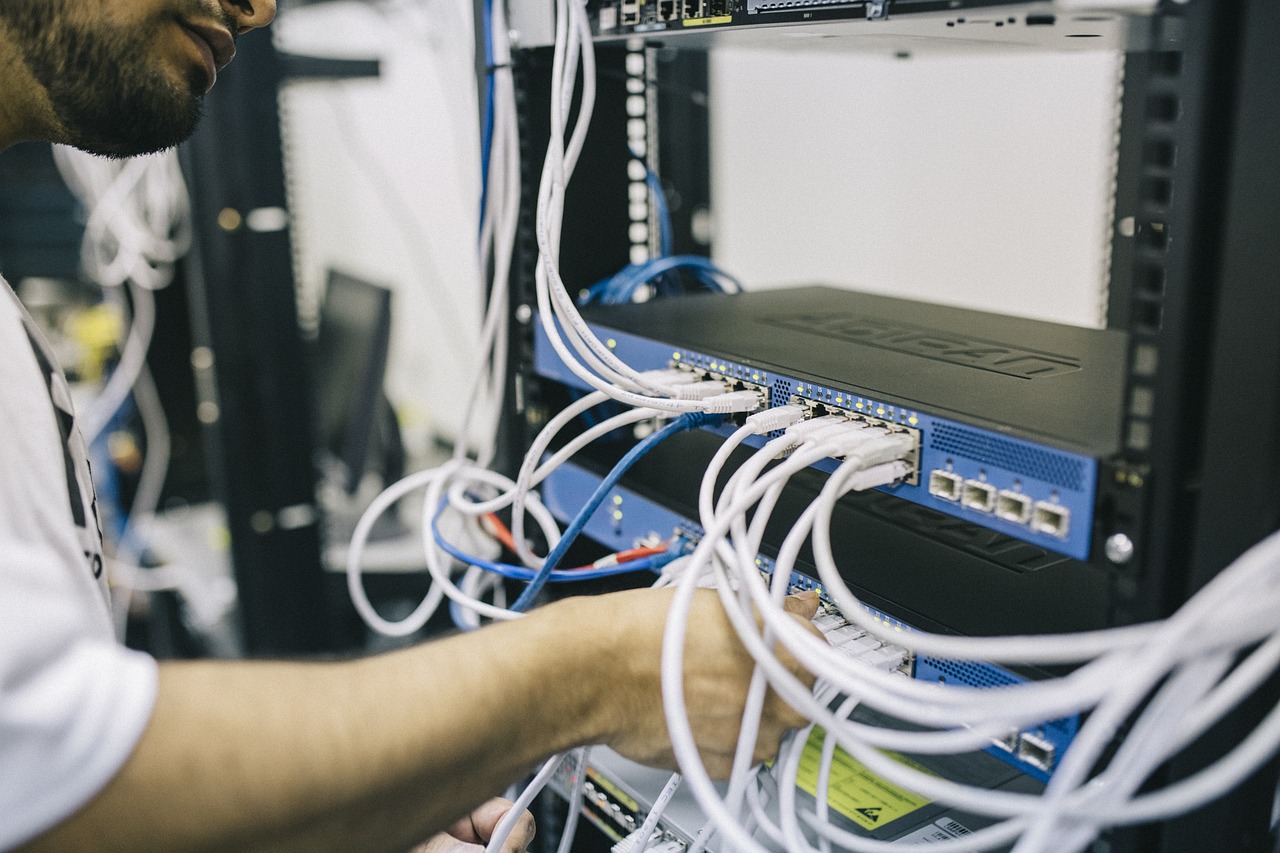What Does a Network Engineer Do?
Behind every business’ seamless and reliable internet connection, there’s a network engineer working hard to ensure all systems are optimally functioning. Yet, many people are still unclear on the role of a network engineer. What does a network engineer really do? In this blog post, we’ll explore the responsibilities and duties of a network engineer, and why their services are essential for many companies to succeed.
Network Design:


A network engineer is responsible for designing network infrastructures tailored to specific businesses’ needs. They determine the ideal hardware and software components for a network, as well as how they interact with one another. They also ensure that network designs remain scalable in order to support future growth and avoid costly installations in the long run.
Designing a network is akin to crafting a detailed blueprint for a building—it’s a meticulous process that requires significant expertise, foresight, and strategic planning. Initially, a network engineer must understand the organization’s needs, which might include projected data usage, the number of users, and any specific software requirements. Once these factors are clear, the engineer can begin to map out the network design.
The first step typically involves selecting the right hardware, such as routers, switches, and servers, that will form the backbone of the network. The network engineer also needs to choose the appropriate software, including operating systems and security programs, which will be installed on these hardware components.
After this, the network engineer establishes how these elements will interact in the network. They’ll create a logical diagram showing how data will flow through the network, how devices will connect, and where firewalls and other security measures will be placed.
Lastly, scalability is a crucial consideration in the design process. The network engineer has to ensure that the network can be easily expanded or modified as the organization grows or its needs change. This can save the company substantial costs and effort in the future. Through this thorough and strategic process, network engineers lay the groundwork for efficient and secure internet connectivity.
Installation and Maintenance:


Installing and maintaining network systems are also within a network engineer’s scope of work. After determining ideal network designs, network engineers are tasked with setting up hardware and software components. They also ensure these components are always up-to-date as software upgrades and hardware repairs become necessary. They carry out regular maintenance and troubleshooting for optimal performance and minimal downtime.
In the event of hardware failure, network engineers are well equipped to manage the situation. They first diagnose the problem, identifying the specific piece of equipment that has faltered. Once the faulty hardware is identified, they ensure minimal impact on regular network operations by implementing temporary measures or shifting the workload to other parts of the network.
The next step involves procuring the replacement hardware. Network engineers are responsible for sourcing the necessary parts, often working closely with vendors to ensure the replacement is compatible and meets the organization’s specifications. In many cases, they might have standby equipment ready as part of disaster recovery planning.
After obtaining the replacement, they carefully swap out the faulty component. This requires significant technical proficiency and an understanding of the network architecture to avoid any disruption to the system. In sophisticated network environments, this may involve coordinating with other IT professionals to schedule downtime if necessary.
Post-installation, network engineers thoroughly test the new component to ensure seamless integration with the existing network. They monitor the performance, rectify any configuration issues, and only when they are confident that the network is operating robustly is the job considered complete. The entire process is meticulously conducted, ensuring the least possible disruption to network services and maintaining the trust businesses place in them.
Network Security:


Network engineers also prioritize network security in order to prevent unauthorized access and data breaches. They monitor network security closely and implement the right measures to avoid potential threats. They also manage and configure firewalls, network segmentation, and VPNs to maintain a secure network and ensure company information is safe from cyber threats.
Network engineers are the gatekeepers of a company’s digital fort, always vigilant to safeguard the company’s precious data from cyber threats. The process of securing a network involves multiple layers of protection, often referred to as ‘defense in depth’.
To start with, network engineers set up firewalls – the first line of defense against external threats. These firewalls act as sentries, controlling the inbound and outbound network traffic based on an organization’s previously determined security policies.
Beyond firewalls, network engineers use Intrusion Detection Systems (IDS) or Intrusion Prevention Systems (IPS) to monitor network traffic and flag suspicious activities. These systems can often identify and halt cyber-attacks in real time, providing an extra layer of defense.
Additionally, network engineers secure a network by implementing Network Access Control (NAC) measures. Network Access Control restricts the availability of network resources to endpoint devices that comply with a defined security policy. It’s a way of ensuring that only trusted devices with the right credentials can access the network.
On top of this, engineers regularly apply security patches and software updates. These updates are crucial as they often include fixes for security vulnerabilities that hackers could exploit.
Lastly, but certainly not least, network engineers also establish Virtual Private Networks (VPNs) for secure, remote access. VPNs encrypt the data in transit, ensuring that remote users can access the network securely from anywhere.
This layered security approach helps ensure that even if one defense is breached, the intruder must still contend with several other obstacles. Network engineers are constantly evolving these strategies to keep up with the continuously changing landscape of cyber threats.
Network Management:


Proper network management is essential for ensuring all business processes run smoothly. Network engineers oversee network operations to ensure everything is running properly. They supervise a team of network administrators and technicians to guarantee compliance with network policies and standards. Additionally, they perform regular audits to identify potential network issues and implement solutions before they can cause problems.
Network engineers utilize a variety of network management tools to effectively monitor, control, and administer networks. One such tool is a Network Performance Monitor (NPM), which aids in diagnosing performance issues such as network delays and bottlenecks. NPMs provide real-time analytics and visibility into the health and performance of a network, offering engineers insights into areas that need improvement.
Another important management tool commonly used by network engineers is a Network Configuration Manager (NCM). NCMs help manage the configuration of network devices, reducing the time and effort required to manage network configurations manually. They can automate tasks such as rolling out configuration changes and backing up configurations, making network management a much more efficient process.
Network engineers also make use of Network Traffic Analyzers (NTAs). These tools provide a comprehensive view of network traffic, helping engineers understand how bandwidth is being used in their network and by whom. This can help identify unusual traffic patterns and potential security threats.
Lastly, network engineers might use a Network Security Scanner, a tool that performs a network-wide scan to identify potential vulnerabilities such as open ports, unpatched software, or improper configurations. This tool assists in maintaining the security and integrity of the network.
All these tools play a crucial role in comprehensive network management, enabling network engineers to improve performance, automate tasks, analyze traffic, and maintain security. These tools are constantly being updated and improved to keep pace with evolving network technologies and threats. The choice of tools may vary depending on the specific needs and requirements of the network.
Network Optimization:
Network optimization is the key to delivering optimal performance and achieving maximum efficiency. Network engineers are always seeking ways to optimize network performance. They investigate factors like network speed, latency, and capacity to ensure smooth and fast connections. Network engineers also work to optimize networking protocols and configuration to ensure maximum network performance.
Network engineers have several strategies to optimize a network and ensure peak performance. For example, they might employ load balancing, which distributes network traffic across several servers to enhance speed and reliability. By spreading the network load evenly, individual servers are prevented from becoming overwhelmed, thus ensuring smooth and efficient operation.
Another strategy is Quality of Service (QoS) settings control, which prioritizes certain types of data — like VoIP or video streaming — over others. By prioritizing time-sensitive data, network engineers can ensure important information is transmitted quickly, even during periods of high network traffic.
Network engineers can also optimize a network through bandwidth shaping or throttling. This involves regulating network traffic to reduce bandwidth congestion and prevent network crashes. For instance, non-critical services could be limited during peak usage times to ensure more bandwidth is available for critical operations.
Caching is another effective technique for network optimization. Here, recently accessed information is stored for quick retrieval, reducing the need for repeated data transmission and subsequently improving network speed.
Engineers can also ensure regular software updates and patch management to keep network devices running efficiently. Updated software often contains optimizations and improvements over previous versions, and patches can fix known issues that could be causing performance bottlenecks.
Lastly, network segmentation can optimize a network by splitting it into smaller parts. This reduces congestion by keeping traffic confined to specific segments, improves security by limiting potential attack surfaces, and makes it easier to troubleshoot issues since they’re confined to specific network segments.
In conclusion, network optimization is a multifaceted undertaking that requires a deep understanding of networking protocols, hardware capabilities, and the unique needs of the organization. Through a combination of various techniques and ongoing proactive management, network engineers can optimize network performance and ensure reliable, efficient operations.
How do you become a network engineer?
Becoming a network engineer is a journey often initiated with a bachelor’s degree in a related field such as computer science, IT, or network administration. This provides a solid theoretical foundation in key concepts like data structures, algorithms, and computer networks. But don’t sweat if college isn’t an option for you right now. You can kickstart your career with relevant certifications and practical experience.
In the world of networking, certifications are paramount. The Cisco Certified Network Associate (CCNA) is a widely recognized entry-level certification that covers the basics of networking, including network security, routing, and switching. Following the CCNA, you can aim for the Cisco Certified Network Professional (CCNP) which delves deeper into networking concepts and can help you specialize in areas like security or wireless networking.
Then there’s CompTIA Network+, a vendor-neutral certification that covers the essentials of networking. Other noteworthy certifications include Cisco Certified Internetwork Expert (CCIE) and Juniper Networks Certified Internet Expert (JNCIE), which are tailored towards advanced professionals.
Beyond these, experience plays a critical role. Most network engineers start in entry-level positions such as network technician or helpdesk support. These roles offer firsthand experience in troubleshooting network issues, configuring network devices, and interacting with various network technologies. Over time, as expertise grows, so do opportunities for advancement.
Indeed, many network administrators or systems administrators, after gaining extensive experience and additional certifications, transition into network engineering roles. These roles often involve design and implementation of larger, more complex network structures.
Lastly, never underestimate the power of a curious mind. Networking technology is continuously evolving, and therefore, learning is a lifelong pursuit in this career. Regularly following industry trends, participating in professional networking groups, and continuously honing your skills can help you stay competitive in the field.
And there you have it! With the right blend of education, certification, experience, and a fervor for continuous learning, you are well on your way to becoming a network engineer. The journey may be challenging, but the rewards – including a satisfying career solving complex network challenges – make it all worthwhile.
Shortage of network engineers in the global market
The global IT market is currently grappling with a glaring shortage of network engineers, a situation that creates a unique set of challenges for businesses and organizations. With the ever-increasing reliance on secure and efficient networks for virtually all operations, the demand for skilled network engineers has grown exponentially. However, meeting this demand has proven to be difficult, primarily due to a lack of adequately trained IT personnel.
First and foremost, the complexity of the network engineer’s role makes it a difficult position to fill. Network engineers must possess a robust blend of technical prowess, problem-solving skills, and a deep understanding of networking technologies and protocols. This requires intensive training and hands-on experience, which many aspiring IT professionals may not have.
Moreover, the rapid pace of technological advancements in the networking field necessitates continuous learning. Network engineers must regularly update their knowledge and skills, earning new certifications and learning about emerging technologies. This constant requirement for upskilling can be off-putting for some, limiting the number of individuals who choose to pursue this career path.
Even when businesses manage to find and hire network engineers, retaining them presents another hurdle. The high demand for these professionals often leads to intense competition among businesses, resulting in frequent job changes and a lack of long-term commitment. Many network engineers are lured away by better compensation packages, opportunities for professional development, and more challenging roles at other organizations.
Additionally, the work of a network engineer is demanding, and burnout rates are high. The job often involves long hours, high stress, and little room for error. Without a healthy work-life balance and proper job satisfaction, network engineers may opt to leave the profession altogether.
In conclusion, the lack of network engineers in the global market is a multifaceted issue. It is a combination of the high bar for entry into the profession, the continuous need for upskilling, the competitive job market, and the demanding nature of the role itself. As such, businesses and organizations must rethink their strategies for attracting and retaining network engineers to secure their network infrastructures effectively.
To sum it up
In conclusion, a network engineer is a critical member of any company’s IT team. They are responsible for designing, installing, and maintaining the network infrastructure, ensuring security, optimizing performance, and carrying out network operations management. Their essential role in the smooth functioning of a company’s online communication and data management cannot be overstated. Network engineers work to guarantee IT infrastructures that provide seamless business processes and overall success for the companies they collaborate with.






